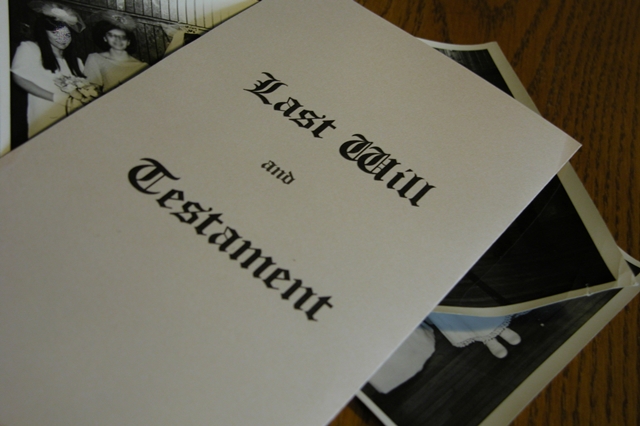With This Estate Plan, You May Take My Coat

Individuals sometimes ask me, why, if they are not millionaires, do they need an estate plan, ending with something akin to, “I’m not rich; I don’t have anything.” My response is usually the typical T&E (Trusts and Estates) mantra, “You don’t need to be ‘rich” to need an estate plan.” Furthermore, the converse is generally true – the smaller estates need equal, if not more, protection. Moreover, non-millionaire employees are “richer” than they think. Like an IRS person once said, “Stop thinking it’s your money.” So, if you\’ve been steadily employed, don’t think that the federal government sees you as a pauper, irrespective of your current financial woes. Acknowledging that these are horrendous economic times citizens worldwide, I must say that millions are also fortunate. They are employed; have retirement or profit-sharing plans; have life insurance; and they have a house, which may be worth less than what they paid for but they still own a home. My “Who Killed Kenny” winter down coat is worth less than what was paid for it but, considering January in Chicago, it would take a permanent move to my favorite desert oasis to get me to sell that coat. Pardon my slight digression, though I think you got the point: It may feel like you’re managing paycheck-to-paycheck, but even so, you may find solace in the midst of this economic maelstrom. Consider your retirement plan. It may have taken a beating over the summer, like most of our financial accounts. However, you may still be able to use your plan to your advantage in the long-term and/or to your loved ones advantage. The 2 most popular retirement accounts are 401(k)s and Individual Retirement Accounts (IRAs). A 401(k) is typically a qualified plan where your employer matches your contributions. Teachers often have 403(b) accounts that operate in basically the same way as a 401(k). While 401(k) contributions are tax deductible, generally any income earned is taxed on withdrawal. Additionally, once you reach 70 ½, you must make a required minimum distribution (RMD). With a 401(k), your spouse is presumed to be the beneficiary, so if you designate other beneficiaries in your will, your spouse must waive their right to the distribution in order for the other beneficiaries to take. Also, because 401(k) plans are governed by federal law, civil union partners cannot be designated spousal beneficiaries of 401(k) plans. IRAs provide a little more flexibility than 401(k)s, because there is no RMD at any age and withdrawals from Roth IRAs are not taxed. However, the maximum contribution is significantly lower than that of a 401(k) and an IRA account may not even be available if you also have a 401(k). Still, unlike a 401(k), with an IRA, there is no presumption of a spousal beneficiary, so who you names as beneficiary, even if it is your civil union partner or same-gender spouse, is the beneficiary. If that person passes away, then the beneficiary will be the person named next or if there’s no contingent, the distribution will follow the state’s testamentary code. Equally important, you can provide for your grandchildren by creating IRAs for them, so that the distribution that would be made to your children is instead rolled over into accounts for your grandchildren. So before you think you’re “not rich,” consider your retirement plan. Basic it may be, but if properly implemented, it could provide you with comfort like my \”Who Killed Kenny\” coat on those cold, January, Chicago days.
The 3 Tenancies and Your Planning: It’s Not about Rent

In the legal field, we use and create terms and phrases that sound familiar to non-legal professionals, but are strangers when a legal professional provides the actual definition. Take, for example the term, “tenancy.” It sounds like it’s related to renting property, and it is – sort of, sometimes as when you’re discussing leases. However, when discussing legacy planning, it’s a much larger animal. In legacy planning, lawyers primarily discuss 3 tenancies, most of which involve real property or bank account ownership, not renting. Tenancy in common is the most basic type of tenancy ownership. A tenants in common relationship between 2 people over a house, for example, means that one party controls interest in one half of the house, and the other party controls interest over the other half. Either party can sell, lease, mortgage, or devise their interest in half of the property. However, if the other party passes away, generally the surviving party does not get the other half of the property; the survivor is left with his or her interest alone. The remaining half is either bequeathed or passed to the decedent’s heirs via state law.People are rarely tenants in common with respect to bank accounts; this type of arrangement is usually crafted for prenuptial agreements or settlement agreements and, then, the focus is often the parties’ contribution to the account. Joint tenancy with rights of survivorship, on the other hand, allows the surviving party in the above example with the house to own the whole house. Joint accounts are also very common with respect to bank accounts, checking or saving. So, if Grandpa has a bank account and you are on the account as a joint holder, when Grandpa passes away, all of the funds in that account become yours, under most circumstances.However, joint tenancy is the animal that can become a beast for parents trying to leave property for children. Placing a house in joint tenancy with right of survivorship to a child could trigger a taxable event for the child. Additionally, suppose you have 2 children, the house, and life insurance. The house is worth $200,000 and the life insurance benefit is $200,000. You might think that leaving the house to one child and designating the other as beneficiary on the life insurance policy would be an even split. Yet, the child with the house may have to pay estate or gift taxes on the home, leaving the gifts to your children unequal. Tenancy by the entirety is joint tenancy for married couples. This may seem straightforward because most people know that transfers between husband and wife are not taxable events. But, what if the transfer was from husband to husband or wife to wife? Because the IRS doesn’t recognize husband to husband or wife to wife transfers, the survivor of the couple may be facing a taxable event like the child with the house. So when thinking about gifts or transfers of property, careful planning is needed to avoid these non-rental sticky wickets.
Taking the \”Estate\” Out of \”Estate Planning\”

People hearing the term, “estate planning” or even “legacy planning,” often wince, squirm, and cringe unless they are within a very fortunate income tax bracket. However, not one to be deterred, when I receive the rolling eyes or blank stare, I reach into my “unraveling legalese” briefcase and offer the following clarification: Your “estate” is anything you own. It doesn’t have to be a million-dollar home or a 1967 Aston Martin. It can include the 150 classic jazz LPs that belonged to your father, your grandmother’s wedding ring, or you and your spouse’s stubs to the Blackhawks 2010 championship. The goodwill created in your small business is also part of your estate, your legacy. Additionally, included are contracts in which you’ve assigned rights to be effectuated at a certain time, i.e., life insurance. Note, however, that though life insurance is a component of your entire estate, it is not part of your probate estate. Estate planning is the process by which everything you own and will likely own or inherit, as well as your liabilities and obligations, is considered to determine how best to transfer your possessions to your heirs and/or intended beneficiaries. If you own a home, a retirement account, life insurance, have one or more dependents and a dog, deciding on who gets what and why is the process of estate planning. Estate planning is not limited to considering how beneficiaries can inherit tax-free or how one can use the current state and federal tax laws to the advantage of your living trust beneficiaries. Estate planning also includes anticipating scenarios such as ensuring that the needs of dependents or a partner with special challenges is provided for and providing for special beneficiaries who may not yet be born. Hence, estate planning is just planning for your future. It is not a tool merely for the wealthy; estate planning is a tool for the wise.
5 Reasons Why a Will Might Be for You

Generally, I advise clients that trusts are more appropriate, especially if the client wants his or her heirs or beneficiaries to avoid probate. Preventing an estate from going through probate is beneficial if the estate is sizable, i.e., consists of a house, life insurance, a retirement plan or securities, one or more automobiles, and furnishings. However, there are circumstances when a will may be more appropriate: If there is no will, then the property might be distributed to, or in proportions, someone unintended by the decedent. For example, your spouse might only receive 1/3 of the estate’s personal and real property and the remaining 2/3 will go to a child or relative who kicked your dog. Equally egregious is that the property could be distributed to the state, which may have already benefited from receiving several years of income and sales taxes from you. If the estate is modest, for example $100,000 – $200,000, avoiding probate is even more reasonable and it may be possible to waive a probate hearing, so a trust under these circumstances is probably unwarranted. A grantor may not want to designate a trustee and may not want to be a trustee during his or her lifetime.* So, by using a will, a sizable estate will go through probate but each legatee will ultimately be responsible for the preservation and enrichment – or diminution – of his or her own gift. If the testator has minor children and doesn’t want the court to determine guardianship in the event of death or incapacity, then a will can nominate who should be the guardian. A grantor with no desire to continually update a trust document may use a pour-over will, a simple mechanism by which all of the estate is designated to a trust. Okay, so this one is a compromise betwixt the 2 but \”4 1/2 Reasons…\” just didn\’t flow. * A settlor, also referred to as a “grantor,” is the individual who creates the trust.

